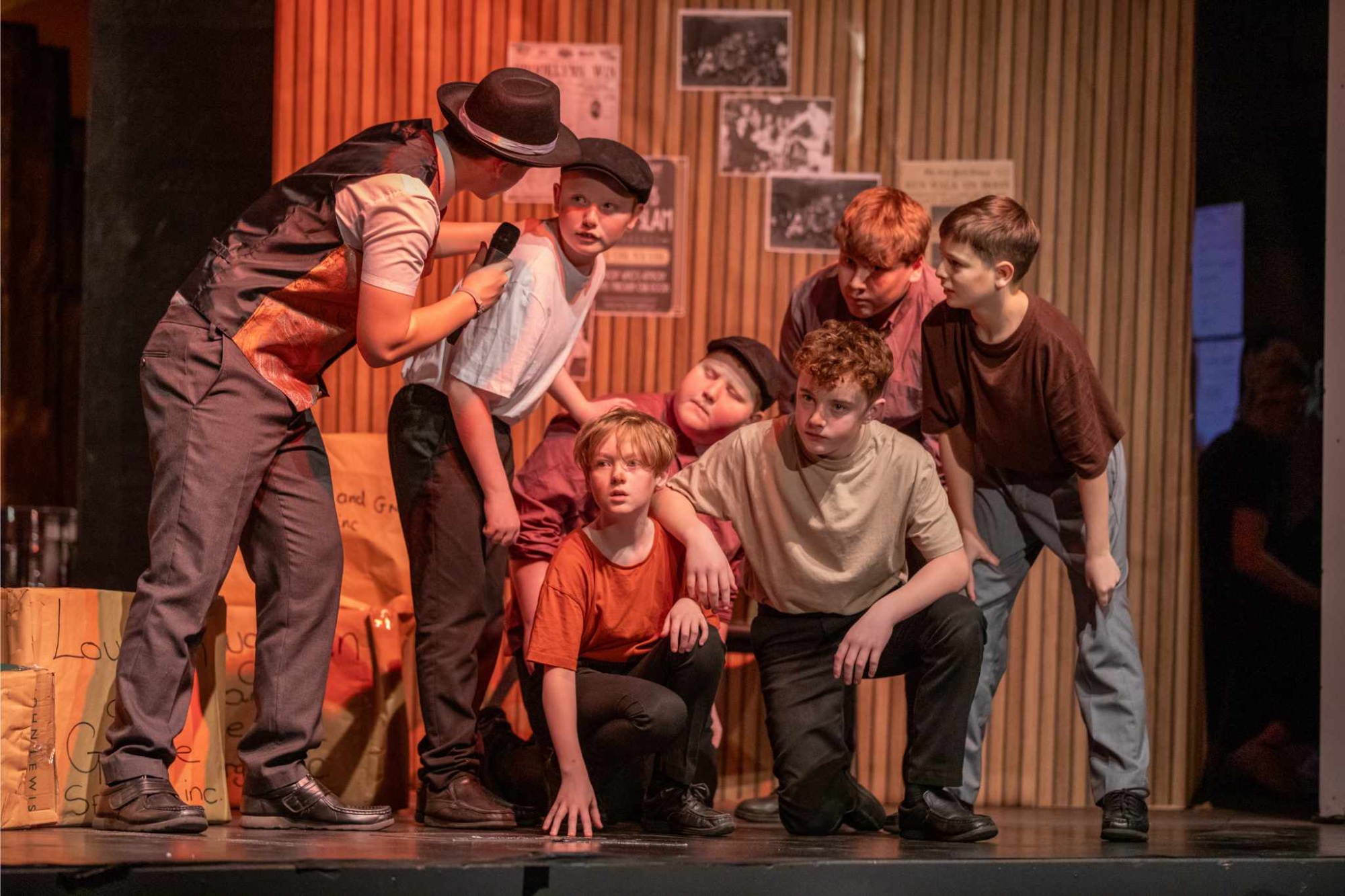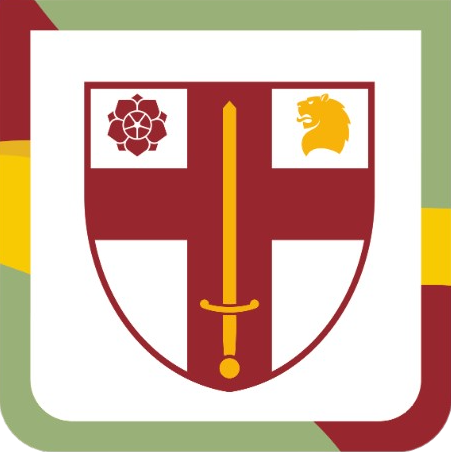Drama
Overview
We offer a practical, creative, and ambitious Drama curriculum that allows our pupils to explore, create, rehearse and perform in both individual and collaborative settings. Through a range of engaging practical activities, our students develop key performance skills such as, characterisation, script work and devising. Alongside these, they build essential social and emotional skills including confidence, teamwork, empathy, and communication. In KS3, pupils master the fundamental elements of drama—such as physical, vocal, spatial, role, atmosphere and structure—enabling them to confidently devise, perform, and evaluate their own and others’ work.
Students are encouraged to explore drama from a wide variety of styles, cultures, and historical contexts, using this knowledge to inspire and inform their own performances. The understanding of key theatrical terminology, stagecraft, and performance techniques is developed through practical exploration.
We offer an engaging, creative, and professionally focused Drama curriculum at KS4 and KS5 that equips pupils with the performance, technical, and analytical skills required for success in the performing arts industry. At KS4, through the Pearson Level 2 Technical Award in Performing Arts (Acting), students explore a range of performance styles and practitioners while developing key skills in characterisation, performance skills, techniques and stagecraft. They work collaboratively to devise and perform original pieces as well as interpret existing scripts, developing resilience, creativity, and effective communication. Pupils also gain an understanding of the wider performing arts industry through research, evaluation, and reflection, preparing them for progression into further study or performance contexts.
At KS5, through the BTEC Level 3 Extended Certificate in Performing Arts, students refine and extend their practical performance techniques to a professional standard. They engage critically with a range of practitioners and genres, applying theoretical understanding to both devised and scripted work. The curriculum places strong emphasis on rehearsal discipline, self-management, and creative problem-solving, developing independence and confidence in performance and production roles. Learners also explore industry expectations, audition techniques, and progression pathways into higher education or employment within the arts sector.
Across both key stages, cultural capital is enriched through exposure to live theatre, workshops with industry professionals, and extra-curricular productions. Students are encouraged to reflect on their creative process and performances, helping them develop both as artists and as professionals in the performing arts.
Year 7
Topics pupils will explore
- An actor’s toolkit- An introduction to physical and vocal performance skills and their application to performance work. Schemes explored:
- Voice in Performance
- Silent Movies
Creating
- Exploring and developing characterisation skills
- Developing role play within devised and scripted performances
- Responding to a range of stimulus such as poems, quotes and texts
- Developing oracy and communication skills through exploration of texts and stimulus
- Leadership roles during rehearsal and devising tasks
- Creative/imaginative thinking to explore and develop material, viewpoints and style
Performing
- Use of blocking and stage directions to support a final performance
- Audience awareness and interaction
- Communicating relationships between actors, characters and the audience
Evaluation
- Identification and analysis of drama skills and their effectiveness
- Exploration of the role and structure of feedback
- Using self and peer assessment to evaluate progress
Year 8
Topics pupils will explore
- Script work
- Pantomime
- Devising theatre
Creating
- To develop ability and confidence with a range of approaches to creating and devising including researching and creating their own stimulus
- To build on characterisation skills and sustaining a role throughout an extended performance
- To develop the use of drama techniques using them to support the creative intention of the performance
Performing
- To develop awareness of stage presence and stage areas
- To convey relationships though the use proxemics
- To show an understanding of the performance requirements of different styles of theatre
- To experience live theatre through trips and visits
Evaluating
- Pupils will experience different means of assessing and evaluating theirs and others work
- Pupils will explore how to support and structure more detailed answers while evaluating their own and others work
- Pupils will develop their drama literacy skills and apply key terms correctly during verbal and written feedback and class discussion
Year 9
Topics pupils will explore
- Exploring the performance space
- An introduction to genre and performance styles
Explore
- Pupils will explore key drama practitioners and theatrical genre
- The creation and development of characters within asset performance style
- Approaches to a range of texts Roles and vocational pathways within the theatre
Develop
- Pupils will develop their ability to create an original character using a variety of styles and techniques Pupils will develop their ability to sustain a role over a complete performance
- Pupils will develop their understanding of the structure of performance
- Pupils will develop their understanding of performance choices
Apply
- Pupils will create extended performances applying a wide range of performance skills to their work.
- Pupils will apply linear and non-linear structures to performances
- Pupils will explore suggesting meaning and intentions in their work showing a clear understanding of their intended dramatic effect
- Pupils will assess and evaluate their work applying their knowledge to make informed judgements and critically analyse their work
Year 10 and 11
Course Overview: Performing Arts
Overall Aim
This qualification provides a balanced blend of practical performance, technical skill development, and analytical understanding. It prepares learners for further education in performing arts, creative industries, or related fields, as well as giving them valuable transferable skills such as teamwork, communication, and creative problem-solving.
Course Structure
The course is designed to assess learners’ applied knowledge, skills, and practices in the performing arts. It consists of three main components, all of which must be successfully completed to achieve the full qualification. Each component develops different aspects of performance, technique, and creativity, preparing learners for progression into higher-level study or work in the performing arts industry.
Component 1: Exploring the Performing Arts
- Assessment Type: Internal assessment set by Pearson, marked by the centre, and moderated by Pearson.
- Nature of Task: Learner’s study professional works to understand key features of performance, production roles, and creative processes
- Duration: Approximately 12 hours of supervised assessment
- Marks: 60 marks
- Focus: Developing understanding of how professional performances are created, exploring styles, genres, and influences within the performing arts
Component 2: Developing Skills and Techniques in the Performing Arts
- Assessment Type: Internal assessment set by Pearson, marked by the centre, and moderated by Pearson
- Nature of Task: Learners develop performance or production skills and techniques through workshops, classes, and rehearsals, applying these to practical work
- Duration: Approximately 15 hours of supervised assessment
- Marks: 60 marks
- Focus: Building and refining practical performance or production skills; demonstrating progression and discipline in rehearsal and performance settings
Component 3: Responding to a Brief
- Assessment Type: External assessment set and marked by Pearson
- Nature of Task: Learners respond to a stimulus provided by Pearson, developing ideas, rehearsing, and performing a workshop piece
- Preparation Period: 12 weeks before the supervised assessment period to plan and develop ideas
- Supervised Assessment: 3 hours (within a Pearson-timetabled window)
- Marks: 60 marks
- Focus: Applying creative, technical, and performance skills to produce and evaluate a live response to a set brief
Extracurricular Activities
Drama Club Theatre – This takes the form of school play rehearsals. This year’s school production will be Peter Pan. Auditions will be held in September and the play will be performed in February.
Drama Association is run by Sixth form students. It offers a wide range of activities, including guest lectures from professional actors, bespoke workshops focusing on performance skills and production experience and talks.

Useful Websites
Liverpool has an excellent selection of youth theatre groups. The following 3 theatres groups come highly recommended:
https://www.atgtickets.com/venues/?&&&gclid=EAIaIQobChMIpq_70b6LgAMVC4dQBh2UzQLXEAAYASAA
https://www.everymanplayhouse.com/
https://liverpoolsroyalcourt.com/
Below are links to theatre podcasts that will support any independent studies linked to performance.
https://podcasts.apple.com/gb/podcast/nt-talks/id486761654?mt=2
https://podcasts.apple.com/gb/podcast/in-the-envelope-the-actors-podcast/id1234645617


